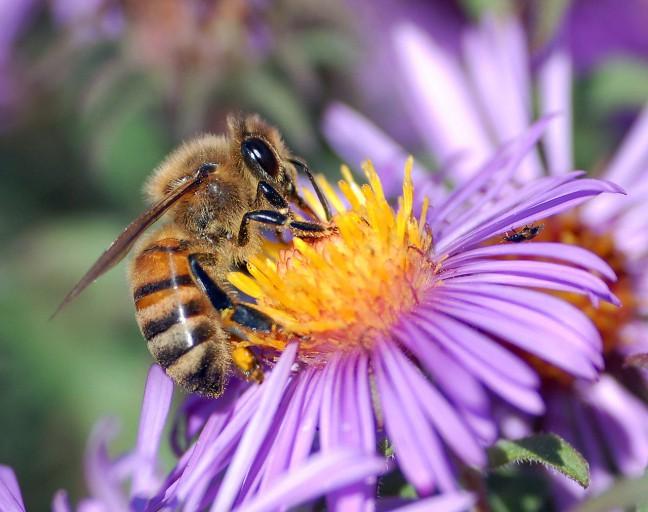Typically, fall colors and dropping temperatures signify the disappearance of pesky summer insects like mosquitos. Some people may breathe a sigh of relief during the cooler months when these insects seem to disappear.
In the summer of 2022, the University of Wisconsin earned its Bee Campus USA certification. In an email to The Badger Herald, Office of Sustainability and team lead for UW’s Bee Campus USA committee Alex Frank said this certification is an impressive feat and one to be proud of.
Bee Campus USA promotes the protection of native pollinators and brings bee-conservation practices to U.S. university and college campuses. Overall, the organization’s efforts have been able to reach 150 Bee Campus affiliates, including UW.
During the warmer months some insects — bees specifically — hold a very important ecological role, according to a Cornell Study. In fact, nearly 75% of crops rely on pollinators such as honey bees, the study found. Their impact is so large that they contribute to one in every three bites of food people consume, according to the study.
The health of the ecosystem heavily relies on the bee population, but it has been on the decline over the past decade, according to the Cornell study. This concerning decrease in bee species diversity and population has a direct effect on the global crop production economy and ecosystem, which is why bee conservation efforts are necessary.
“By earning this certification UW-Madison is showing our commitment to working collaboratively with students, staff and faculty to educate our community about how to create and protect pollinator habitat while implementing additional pollinator-friendly landscape management practices on our campus,” Frank said.
According to Frank, these “pollinator-friendly” landscape practices include increasing the abundance of native plants, providing nest sites and reducing the use of pesticides.
Department of Entomology professor Claudio Gratton said in an email to The Badger Herald that he has high hopes for the outcomes of the Bee Campus Project. He wants to get the community more involved about bee conservation through learning, doing, observing and questioning.
UW worked to support pollinators before earning the certification, Frank said, including planting native plants and using “integrated pest management techniques.”
The certification and the subsequent committee formed to maintain the campus’ bee-inclusive status will provide insight and even more opportunities to improve current practices, according to Frank.
“The team is working on mapping current landscapes on our main campus to identify existing pollinator-supporting habitats as well as areas that could further support pollinators whether that is through new native habitats or increased diversity in native plantings,” Frank said.
Frank also said the ongoing Green Fund project is working to bring pollinator lawns near Tripp Residence Hall and the Lakeshore Path. By keeping pollinators and pollination in mind, this specific project features low-lying flowering plants that provide pollination opportunities.
Since outreach and engagement are big components of upholding the certification, the Office of Sustainability established a website to communicate this important aspect.
For now, Gratton said community participation in the science and discovery for improving the conditions for bees and conservation is a very good way for individuals to support the ideals of the certification.


